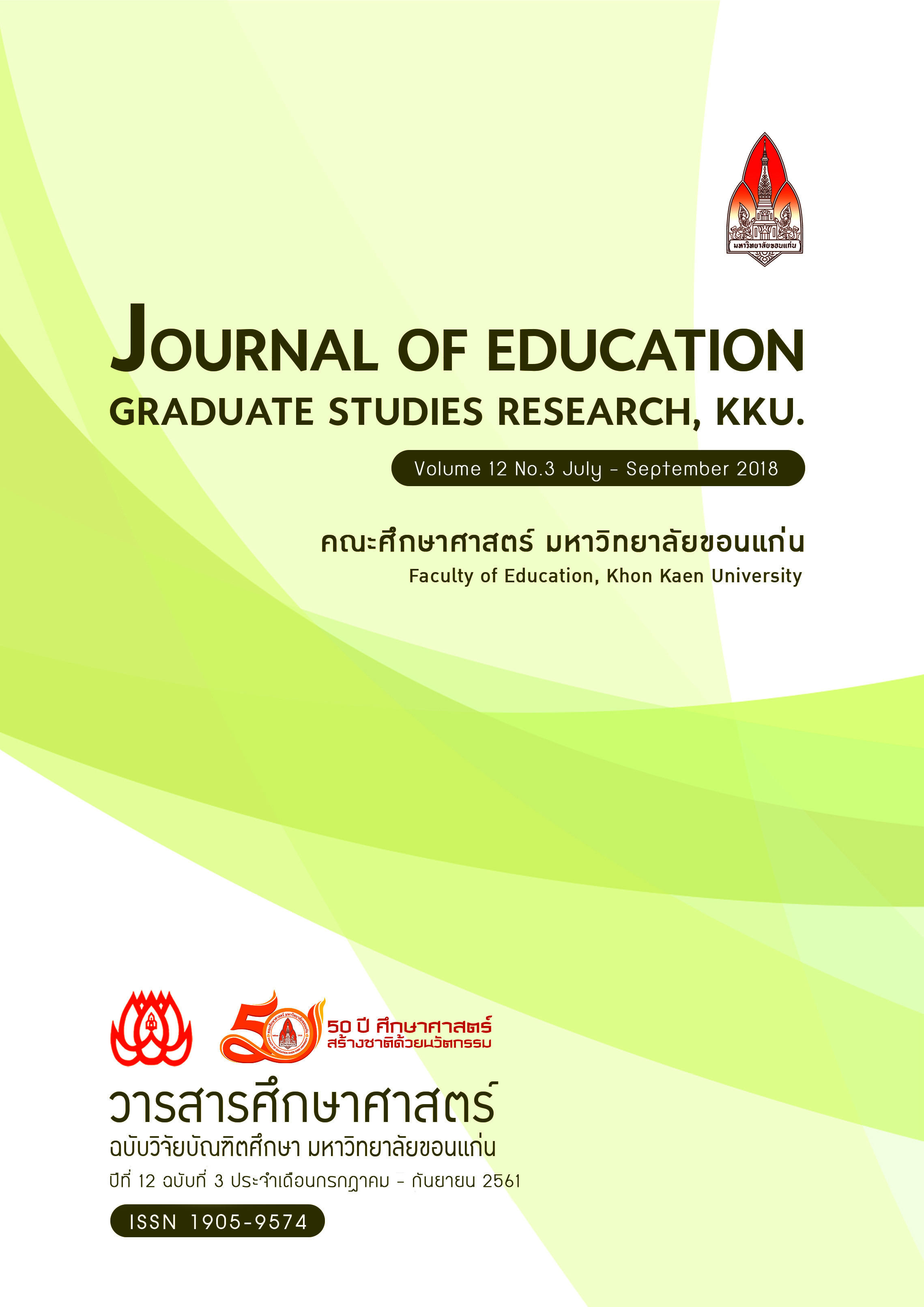The Development of The Art Camp Curriculum in Basics Pottery by Learning Practices Model for Grade 9 Students
Main Article Content
Abstract
The study aimed: 1) to developing art camp curriculum in basics pottery by learning practices model for grade 9 students; 2) to study the result of using art camp curriculum in basics pottery by learning practices model for grade 9 students which required students to have average score not less than 80% and more than 80% of all students were required to pass the assigned criteria, and 3) to explore grade 9 students’ satisfaction towards the learning of art camp curriculum in basics pottery by learning practices model. The sample is grade 9 students in Sriboonrueang Wittayakarn School Sriboonrueang District, Nong Bua Lamphu who studies in the second semester of the academic year 2016. The classroom consisted of 56 students. The instruments used in this research included with art camp curriculum in basics pottery by learning practices model for grade 9 students which consist 7 lesson plans, performance evaluation form and student satisfaction survey The statistical analysis is the Percentage and mean and standard deviation (S.D.)
The study showed that
- The development of the art camp curriculum in basics pottery by learning practices model for grade 9 students. It was found that the expert opinions toward the art camp curriculum as a whole were at a highly appropriate level (
= 3.99) that can be used in class.
- The results of using an art camp curriculum in basics pottery. Students got an average point = 17.87 from 20 score or equal to 89.28 percent. However, only 56 students or equal to 100 percent passed the assigned criteria.
- The results of students’ satisfaction were reported at a good level in every item. When considering the ranking from the highest to the lowest level, the result was that the knowledge from this activity (
= 4.30, S.D. = 0.11). Following by, how to organize the activity (
= 4.22, S.D. = 0.12) and the preparation for ( = 4.18, S.D. = 0.07)
Article Details
References
เกษแก้ว วิเศษชาติ และคณะ. (2555). การจัดการเรียนรู้รูปแบบการเรียนรู้แบบเน้นการปฏิบัติ ในวิชาคอมพิวเตอร์.
ค้นเมื่อ 23 กันยายน 2559, จาก https://comed5kku.files.wordpress.com
นพดล สายจันทร์. (2557). การพัฒนาหลักสูตรค่ายศิลปะของนักเรียนระดับชั้นมัธยมศึกษาปีที่ 6. วารสารศึกษาศาสตร์ ฉบับวิจัยบัณฑิตศึกษา มหาวิทยาลัยขอนแก่น, 37(2), 6-13.
บุญชม ศรีสะอาด และสุริทอง ศรีสะอาด. (2554). การวิจัยเกี่ยวกับการบริหารการศึกษา. พิมพ์ครั้งที่ 2. กรุงเทพฯ: สุวีริยาสาส์น.
วราภรณ์ โพธิ์จันทร์. (2559). ผลการจัดกิจกรรมค่ายศิลปะเรื่องศิลปะธรรมชาติและสิ่งแวดล้อมชั้นประถมศึกษาปีที่ 4 โรงเรียนสาธิตศึกษาศาสตร์มหาวิทยาลัยขอนแก่น. วารสารศึกษาศาสตร์ ฉบับวิจัยบัณฑิตศึกษา มหาวิทยาลัยขอนแก่น, 11(4), 6-11.
วัชรินทร์ ศรีรักษา. (2555). รายงานการวิจัยเรื่องความคิดเห็นของนักเรียนที่มีต่อการดำเนิน โครงการค่ายศิลปะ (Art Camp) ของนักเรียนสาธิตมหาวิทยาลัยขอนแก่น ประจำปีการศึกษา 2555. ขอนแก่น: โรงเรียนสาธิตมหาวิทยาลัยขอนแก่น (ศึกษาศาสตร์ระดับประถม มหาวิทยาลัยขอนแก่น).
วิบูลย์ จรูญพันธ์. (2552). การศึกษาเรื่องผลการเรียนรู้แบบกลุ่มร่วมมือด้วยเทคนิค STAD เรื่องการวาดภาพเชิงสร้างสรรค์ กลุ่มสาระการเรียนรู้ศิลปะ ชั้นประถมศึกษาปีที่ 6. การศึกษาค้นคว้าอิสระปริญญาการศึกษามหาบัณฑิต สาขาวิชาหลักสูตรและการสอน บัณฑิตวิทยาลัย มหาวิทยาลัยมหาสารคาม.
หลักสูตรสถานศึกษา. (2558). หลักสูตรสถานศึกษาโรงเรียนศรีบุญเรืองวิทยาคาร กลุ่มสาระการเรียนรู้ศิลปะตามหลักสูตรแกนกลางการศึกษาขั้นพื้นฐาน พุทธศักราช 2551 (ฉบับแก้ไข ปรับปรุง). โรงเรียนศรีบุญเรืองวิทยาคาร จังหวัดหนองบัวลำภู. (อัดสำเนา)
สมาน นามปัญญา. (2559). รูปแบบภาวะผู้นำเพื่อการเข้าสู่ประชาคมอาเซียนของผู้บริหารโรงเรียนขยายโอกาสทางการศึกษาในจังหวัดอุบลราชธานี. ค้นเมื่อ 19 กันยายน 2559, จาก http://www.ptu.ac.th/journal/data/8-1/8-1-12.pdf.
Borg & Gall. (1969). Educational Research An Introduction. Sixth Edition. New York: Long man Publishers.
Dewey John. (1956). The Child and the Curriculum and The School and Society. Chicago: Phoenix Books.
Taba. (1962). Curriculum development theory and practice. New York, NY: Harcourt, Brace & World

